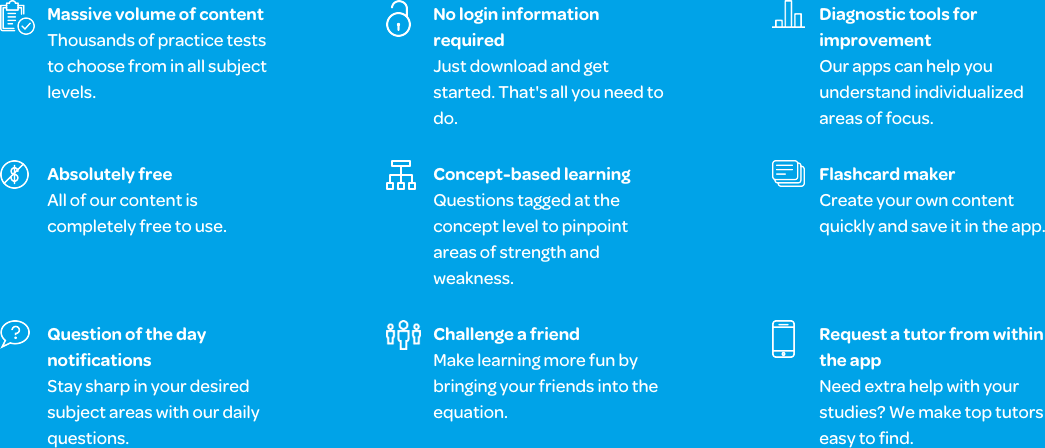The Varsity Tutors AP Biology Mobile App
To pass the AP Biology exam, you must be able to apply the concepts you learn to the problems with which you are presented. Problem-solving is only one part of the equation. You must also be able to design your own experiments and analyze the results. An ability to interpret data and create conceptual models is essential if you want to earn a 4 or 5. The Varsity Tutors AP Biology app for Android, iPad, and iPhone, available on iTunes and the Google Play Store, helps you create a personalized study routine to prepare for the exam.
Broken up into a multiple-choice section and a free response section, the test requires the use of math to explain biological processes. You must be able to formulate your own predictions, justify specific phenomena, and design experiments while also demonstrating proficiency at manipulating and interpreting data. You have 90 minutes to complete each section. There are 63 multiple-choice questions, and the free response section begins with a 10-minute reading period.
On the AP Biology exam, you can take as much time as you need on each question. Still, it’s important to budget time wisely. Proctors will announce how much time is left, but it is up to you to move efficiently from one question to the next. The app’s practice tests can help you get more comfortable with this format so you can anticipate how you’ll perform under test conditions.
To many, this setup may seem complicated. The free Varsity Tutors AP Biology app simulates the exam experience. You can use flashcards, full-length practice tests, and Learn by Concept to review questions on the relevant subject matter. Each is intended to simulate the test’s content and environment and enables you to brush up on specific topics and concepts.
You can hone in on individual concepts, ranging from cell functions to DNA and RNA. There are questions that cover cellular structure, proteins, macromolecules, natural selection, and more. With the full-length practice tests, you can discover the concepts you’ve already mastered and those you need to review. You can even analyze your speed, so you can track your progress as the test gets closer. By personalizing your study plan, you can maximize your efficiency and accuracy on the AP Biology exam.
Practice takes time but, if you’re in a hurry, you can use the Question of the Day. It can give you small study boosts at a time, and is easy to complete. You can practice a little bit at a time to allow the information to be fully absorbed, especially if you get a wrong answer. The test questions can quickly identify any areas that need improvement.
If you’re enrolled in AP Biology, it’s never too early to start practicing. By studying the app’s relevant materials and questions that have been asked on past exams, you can work toward proficiency in the subject. There are numerous digital tools available to help you get started. Start preparing for the AP Biology exam today with the Varsity Tutors AP Biology app for Android, iPhone, and iPad, available now at the Google Play Store and iTunes.
66 mobile apps to choose from for your tutoring needs.

Learn More
If you excel in science and intend on pursuing a college degree in medicine or life sciences, you might want to consider taking the AP Biology course. The AP Biology course is offered by The College Board, and is equivalent to an introductory college course. By passing the exam, you may be able to earn college credits for biology, earn elective credits, or improve your placement.
In order to successfully pass the AP Biology course, you must be able to demonstrate that you understand the processes, concepts, and scientific terminology that relates to living organisms. The course focuses on how these organisms interact with the environment. To complete this course, you will be required to read and complete assignments on a number of topics relating to biology. This includes supplementary reading in the form of journal articles and diagrams, as well as laboratory assignments and write-ups.
The AP Biology exam is comprised of two sections. The first section is made up of 63 multiple-choice questions, as well as six short-answer, mathematical questions. You are permitted to use a four-function calculator for this portion of the test. The second section of the test has two essay questions which are expected to be answered with detailed, well-thought out summaries. In addition, this section also includes six short answer essay questions. You have 90 minutes to complete each section, giving you a maximum of 180 minutes to finish the test. For section two you have a mandatory reading period of 10 minutes, which leaves you with 80 minutes of writing time.
The content covered in AP Biology is expansive. First, you will be given an introduction to Biology. Here, you will briefly learn about how life exists on multiple levels, from individual cells to organisms, and even how the entire planet as a whole is important in biology because of ecology. Furthermore, you will learn about the evolutionary process, and how natural selection is an essential component of evolution and population genetics.
As a student of AP Biology, you will need to understand the classification of organisms and where they fit within the tree of life. Along with learning about the various types of species, including bacteria, you will also learn about viruses. As you learn about the various organisms that exist, you will be taught the theory of evolution and natural selection. These two concepts are important in biology and explain and why we have vastly different species of plants and animals scattered across the planet, and how climate and different types of terrain influenced biodiversity.
When you learn about the evolution of species, you will also be introduced to DNA. This molecule contains all of an organism’s heredity information and is the quintessential component for living things. Not only will you learn about how DNA was discovered, but you will also learn about how it influences protein synthesis and how your RNA is made through transcription.
An important component of biology is chemistry, which you will learn through understanding the “Chemistry of Life.” Not only will you learn and review the periodic table of elements, but you will need to understand the importance of various chemical bonds and reactions. You will also learn about subatomic particles and atoms, and how they make up all matter.
As you begin to dig deeper into the curriculum, you will begin to learn about metabolism and what role enzymes play in metabolism. Here, you will learn about the various types of energy: kinetic energy, potential energy, and chemical energy. Along with metabolic traffic, you will learn the laws of thermodynamics, and how these laws are relevant to the transfer of energy.
One of the most important aspects of AP Biology is understanding the cellular structures. You will learn the difference between prokaryotic and eukaryotic cells while learning about important structures of each cell. These components include mitochondria, Golgi bodies, and the endomembrane system. By learning about these structures, you can develop a better understanding of how cells work. This includes how the plasma membrane regulates what enters and exits a cell, how cells get energy from food, and how cells use chemicals to communicate with each other.
After understanding the basic concept of cells, you will then be able to see how this relates to your own body. As you learn about human biology, you can begin to see how complex and incredible the human body is. Here, you will learn about the pulmonary and circulatory systems, and how oxygen is transported through the blood our circulatory system pumps.
The human body contains a number of organs and systems that serve specific functions. As you study biology, you will learn about all of the processes that help maintain a healthy functioning body. Along with learning about the body’s vast neural network, you will learn about how kidneys help purge unwanted materials from the blood, and the importance of the body’s immune system and how it works to shield you from pathogens.
Another key component of biology is photosynthesis, which is the method that photosynthetic organisms like plants use light to create sugar from water and carbon dioxide. You will learn about why these organisms play an important role in our ecosystem, as well learn the different stages of photosynthesis.
Approximately one quarter of the class time is dedicated to laboratory assignments. This is so that you can participate in hands-on experiments that allow you to conduct inquiry-based investigations. During these investigations, you will be expected to make predictions, record your results, and analyze your data.
As you gain a deeper understanding of biology, you will begin to grasp the principles and processes that influence living organisms. After completing the course, you should be able to understand the importance of evolution, the various cellular processes that use molecular building blocks and free energy, how genetics work, and how biological systems interact. Furthermore, in order to successfully complete the course, you will need to understand how to collect and analyze data using the scientific method. The AP Biology exam will not only test your understanding of living organisms, but will also assess your ability to solve problems mathematically, interpret and analyze data, and explain answers using a detailed, point-by-point method.




